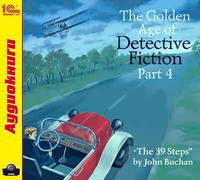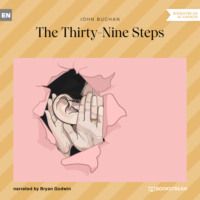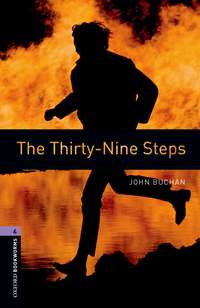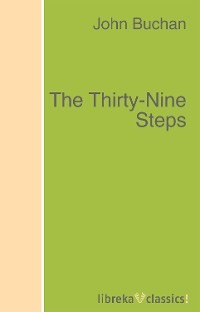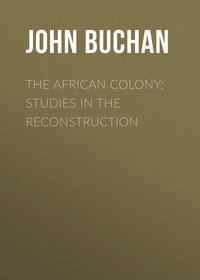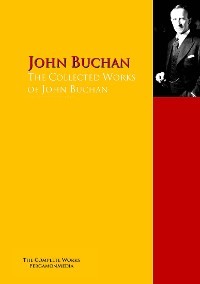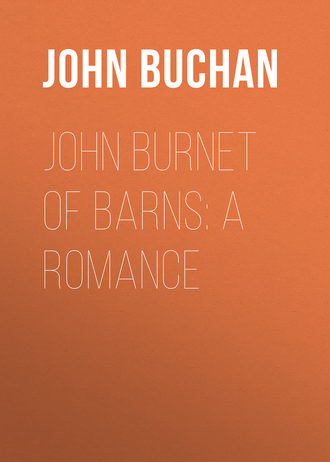 полная версия
полная версияJohn Burnet of Barns: A Romance
"But away with such thoughts," I said, steeling my heart. "There's many a fine thing awaiting me, and, after all, I will be back in a year or two to the place and the folk that I love." So I went down to the village of Eddleston whistling the "Cavalier's Rant," and firmly shutting my mind against thoughts of home. I scarce delayed in Eddleston, but pushed on up the valley, expecting to get dinner at the inn at Leadburn, which stands at the watershed, just where the county of Edinburgh touches our shire of Tweeddale. The way, which is a paradise in summer, was rugged and cold at this season. The banks of the stream were crusted with ice, and every now and then, as I passed, I raised a string of wild duck, who fled noisily to the high wildernesses.
I came to Leadburn about eleven o'clock in the forenoon, somewhat cold in body, but brisk and comforted in spirit. I had Maisie stabled, and myself went into the hostel and bade them get ready dinner. The inn is the most villainous, bleak place that I have ever seen, and I who write this have seen many. The rooms are damp and mouldy, and the chimney-stacks threaten hourly to come down about the heads of the inmates. It stands in the middle of a black peat-bog, which stretches nigh to the Pentland Hills; and if there be a more forsaken countryside on earth, I do not know it. The landlord, nevertheless, was an active, civil man, not spoiled by his surroundings; and he fetched me an excellent dinner – a brace of wild-fowl and a piece of salted beef, washed down with very tolerable wine.
I had just finished, and was resting a little before ordering my horse, when the most discordant noise arose in the inn-yard; and, going to the window, I beheld two great, strong serving-men pulling a collie by a rope tied around the animal's neck. It was a fine, shaggy black-and-white dog, and I know not what it could have done to merit such treatment. But its captors had not an easy task, for it struggled and thrawed at the rope, and snarled savagely, and every now and then made desperate sallies upon the hinder-parts of its leaders. They cursed it, not unnaturally, for an ill-conditioned whelp, and some of the idlers, who are usually found about an inn, flung stones or beat it with sticks from behind. Now I hate, above all things, to see a beast suffer, no matter how it may have deserved it; so I had it in my mind to go down and put a stop to the cruelty, when some one else came before me.
This was a very long, thin man, with a shock of black hair, and a sunburnt face, attired in a disorder of different clothes – a fine, though tarnished coat, stout, serviceable small-clothes, and the coarsest of shoes and stockings. He darted forward like a hawk from a corner of the yard, and, ere I could guess his intentions, had caught the rope and let the dog go free. The beast ran howling to seek shelter, and its preserver stood up to face the disappointed rascals. They glared at him fiercely, and were on the point of rushing on him, had not something in his demeanour deterred them.
"Oh," said he, in a scornful voice, "ye're fine folk, you Leidburn folk. Braw and kindly folk. Graund at hangin' dowgs and tormentin' dumb beasts, but like a wheen skelpit puppies when ye see a man."
"Ye meddlin' deevil," said one, "whae askit ye to come here? The dowg was an ill, useless beast, and it was time it was hangit."
"And what d'ye ca' yoursel?" said the stranger. "I ken ye fine, Tam Tiddup, for a thievin', idle vaigabond, and if every useless beast was hangit, there wadna be yin o' ye here."
This made them grumble, and a stone was thrown, but still something in the easy, dauntless air of their enemy kept them back.
"But I'm no the man to let a dowg gang free wi'oot giein' some kind o' return. Ye're a' brave men, dour warlike men, and I've nae doot unco keen o' a fecht. Is there no some kind o' green bit hereaways whaur I could hae a fling wi' yin o' ye? I'll try ye a' in turn, but no to mak ill-feelin', I'll tak the biggest yin first. Will ye come, ye muckle hash?" he said suddenly, addressing the tallest of the number.
Now the man addressed had clearly no stomach for fight, but he was tall and stout, and stood in fear of the ridicule of his companions, and further, he doubtless thought that he would have an easy victory over the lean stranger, so he accepted with as good a show of readiness as he could muster.
"Come on, ye flee-up-i'-the-air, and I'll see if I canna pit thae fushionless airms o' yours oot o' joint."
I heard them appoint a flat place beside the burn, just on the edge of the bog, and watched them trooping out of the yard. The rabble went first, with a great semblance of valour, and the brown-faced stranger, with a sardonic grin on his countenance, stepped jauntily behind. Now I dearly love a fight, but yet I scarce thought fit to go and look on with the rest; so I had Maisie saddled, and rode after them, that I might look like some chance passer-by stopping to witness the encounter.
When I came up to the place, there were already some thirty men collected. It was a green spot by the side of the Hawes burn, with the frost not lifted from the grass; and in the burn itself the ice lay thick, for it flows sluggishly like all bogland waters, The place was beaten down as if folk were used to go there, and here the men made a ring about their champion, some helping him to unbuckle his belt, some giving advice about how to close with his adversary. The adversary himself stood waiting their pleasure with the most unconcerned air, whistling "The Green Holms o' Linton," and stamping his feet on the ground to keep himself warm.
In a little the two were ready, and stood facing each other on the cold moor. A whistling wind came in short blasts from the hills, and made their ears tingle, and mine also, till I wished that I were one of the two to have some chance of warming my blood. But when once the fight began, I thought little more of the cold.
The countryman gripped the stranger round the middle and tugged desperately to throw him. Up and down, backwards and forwards they went, kicking up in their struggle pieces of turf and little stones. Once they were all but in the water, but the stranger, seeing his peril, made a bold leap back and dragged the other with him. And now I feared that it was going to go hard with the succourer of distressed dogs; for his unwieldy opponent was pressing so heavily upon him that I expected every moment to see him go down. Once I caught sight of his face, and, to my surprise, it was calm as ever; the very straw he had been chewing before being still between his teeth.
Now the fight took another turn; for my friend, by an adroit movement, slipped below the other's arms, flung himself backwards, just as I have seen a tumbler do at a fair at Peebles, and before the other knew his design, stood smiling before him. The man's astonishment was so great that he stood staring, and if the stranger had used his advantage, he might have thrown him there and then. By and by he recovered and came on, swearing and wrathful. "Ye've slippit awa' yince, ye ether, but I'll see that ye'll no dae't again;" and with his sluggish blood roused to some heat, he flung himself on his foe, who received him much as a complacent maid receives the caresses of a traveller. The fellow thought his victory certain, and put out all his strength; but now, of a sudden, my friend woke up. He twisted his long arms round his adversary, and a mighty struggle began. The great, fat-bellied man was swaying to and fro like a basket on a pack-horse; his face grew purple and pale at the lips, and his body grew limper and weaker. I expected to see a good fight, but I was disappointed; for before I knew, they were on the edge of the pool, tottered a second, and then, with a mighty crunching and splashing, bounded through the thin ice into the frosty water.
A great brown face, with draggled, black hair, followed closely by a red and round one, appeared above the surface, and two dripping human beings dragged themselves to the bank. The teeth of both chattered like a smith's shop, but in the mouth of one I espied a yellowish thing, sorely bitten and crumbled. It was the piece of straw. A loud shout greeted their appearance, and much laughter. The one slunk away with his comrades, in no very high fettle, leaving the other shaking himself like a water-dog on the grass.
I found the stranger looking up at me, as I sat my horse, with a glance half-quizzical and half-deprecatory. The water ran down his odd clothes and formed in pools in the bare places of the ground. He shivered in the cold wind, and removed little fragments of ice from his coat. Then he spoke.
"Ye'll be the Laird o' Barns settin' oot on your traivels?"
"Good Lord! What do you know of my business?" I asked, and, as I looked at him, I knew that I had seen the face before. Of a sudden he lifted his arm to rub his eyebrows, and the motion brought back to me at once a vision of excited players and a dry, parched land, and a man perplexedly seeking to convince them of something; and I remembered him for the man who had brought the news to Peebles of the rising of Tweed.
"I know you," I said. "You are the man who came down with news of the great flood. But what do you here?"
"Bide a wee and I'll tell ye. Ye'll mind that ye tellt me if ever I was in need o' onything, to come your way. Weel, I've been up Tweed, and doun Tweed, and ower the hills, and up the hills, till there's nae mair places left for me to gang. So I heard o' your gaun ower the seas, and I took it into my heid that I wad like to gang tae. So here I am, at your service."
The fellow's boldness all but took my breath away. "What, in Heaven's name, would I take you with me for?" I asked. "I doubt we would suit each other ill."
"Na, na, you and me wad gree fine. I've heard tell o' ye, Laird, though ye've heard little o' me, and by a' accoonts we're just made for each ither."
Now if any other one had spoken to me in this tone I should have made short work of him; but I was pleased with this man's conduct in the affair just past, and, besides, I felt I owed something to my promise.
"But," said I, "going to Holland is not like going to Peebles fair, and who is to pay your passage, man?"
"Oh," said he, "I maun e'en be your body-servant, so to speak."
"I have little need of a body-servant. I am used to shifting for myself. But to speak to the purpose, what use could you be to me?"
"What use?" the man repeated. "Eh, sir, ye ken little o' Nicol Plenderleith to talk that gait. A' the folk o' Brochtoun and Tweedsmuir, and awa' ower by Clyde Water ken that there's no his match for rinnin' and speelin' and shootin' wi' the musket; I'll find my way oot o' a hole when a' body else 'ill bide in't. But fie on me to be blawin' my ain trumpet at siccan a speed. But tak me wi' ye, and if I'm no a' I say, ye can cry me for a gowk at the Cross o' Peebles."
Now I know not what possessed me, who am usually of a sober, prudent nature, to listen to this man; but something in his brown, eager face held me captive, and his powerful make filled me with admiration. He was honest and kindly; I had had good evidence of both; and his bravery was beyond doubting. I thought how such a man might be of use to me in a foreign land, both as company and protection. I had taken a liking to the fellow, and, with our family, such likings go for much. Nevertheless, I was almost surprised at myself when I said:
"I like the look of you, Nicol Plenderleith, and am half-minded to take you with me as my servant."
"I thank ye kindly, Laird. I kenned ye wad dae't. I cam to meet ye here wi' my best claes for that very reason."
"You rascal," I cried, half laughing at his confidence, and half angry at his audacity. "I've a good mind to leave you behind after all. You talk as if you were master of all the countryside. But come along; we will see if the landlord has not a more decent suit of clothes for your back if you are going into my service. I will have no coughing, catarrhy fellows about me."
"Hech," muttered my attendant, following, "ye micht as weel expect a heron to get the cauld frae wadin' in the water, as Nicol Plenderleith. Howbeit, your will be done, sir."
From the landlord at the inn I bought a suit of homespun clothes which, by good fortune, fitted Nicol; and left his soaked garments as part payment. Clad decently, he looked a great, stalwart man, though somewhat bent in the back, and with a strange craning forward of the neck, acquired, I think, from much wandering among hills. I hired a horse to take him to Edinburgh, and the two of us rode out of the yard, followed by the parting courtesies of the host.
Of our journey to Edinburgh, I have little else to tell. We came to the town in the afternoon, and went through the streets to the port of Leith, after leaving our horses at the place arranged for. I was grieved to part from Maisie, for I had ridden her from boyhood, and she had come to know my ways wondrous well. We found a vessel to sail the next morn for Rotterdam, and bargained with the captain for our passage. When all had been settled, and we had looked our fill upon the harbour and the craft, and felt the salt of the sea on our lips, we betook ourselves to an inn, The Three Herrings, which fronted the quay, and there abode for the night.
BOOK II – THE LOW COUNTRIES
CHAPTER I
OF MY VOYAGE TO THE LOW COUNTRIES
We were aboard on the next morning by a little after daybreak, for the captain had forewarned me, the night before, that he purposed to catch the morning tide. To one inland-bred, the harbour of Leith was a sight to whet the curiosity, There were vessels of all kinds and sizes, little fishing smacks with brown, home-made sails, from Fife or the Lothian coast towns, great sea-going ships, many with strange, foreign names on their sides, and full of a great bustle of lading and unlading. There was such a concourse of men, too, as made the place like a continuous horse-fair. Half a dozen different tongues jabbered in my ear, of which I knew not one word, save of the French, which I could make a fair shape to speak, having learned it from Tam Todd, along with much else of good and bad. There were men in red cowls like Ayrshire weavers, and men in fur hats from the North, and dark-skinned fellows, too, from the Indies, and all this motley crew would be running up and down jabbering and shrilling like a pack of hounds. And every now and then across the uproar would come the deep voice of a Scots skipper, swearing and hectoring as if the world and all that is in it were his peculiar possession.
But when we had cleared the Roads of Leith and were making fair way down the firth, with a good north-westerly breeze behind us, then there was a sight worth the seeing. For behind lay Leith, with its black masts and tall houses, and at the back again, Edinburgh, with its castle looming up grim and solemn, and further still, the Pentlands, ridged like a saw, running far to the westward. In front I marked the low shore of Fife, with the twin Lomonds, which you can see by climbing Caerdon, or Dollar Law, or any one of the high Tweedside hills. The channel was as blue as a summer sky, with a wintry clearness and a swell which was scarce great enough to break into billows. The Kern, for so the vessel was called, had all her sail set, and bounded gallantly on her way. It was a cheerful sight, what with the sails filling to the wind, and men passing hither and thither at work with the cordage, and the running seas keeping pace with the vessel. The morning fires were being lit in the little villages of Fife, and I could see the smoke curling upwards in a haze from every bay and neuk.
But soon the firth was behind us, and we passed between the Bass rock and the May, out into the open sea. This I scarcely found so much to my liking. I was inland-bred, and somewhat delicate in my senses, so, soon I came to loathe the odour of fish and cookery and sea-water, which was everywhere in the vessel. Then the breeze increased to a stiff wind, and the Kern leaped and rocked among great rolling billows. At first the movement was almost pleasing, being like the motion of a horse's gallop in a smooth field. And this leads me to think that if a boat were but small enough, so as to be more proportionate to the body of man, the rocking of it would be as pleasing as the rise and fall of a horse's stride. But in a great, cumbrous ship, where man is but a little creature, it soon grows wearisome. We stood well out to sea, so I could but mark the bolder features of the land. Even these I soon lost sight of, for the whole earth and air began to dance wofully before my eyes. I felt a dreadful sinking, and a cold sweat began to break on my brow. I had heard of the sea-sickness, but I could not believe that it was this. This was something ten times worse, some deadly plague which Heaven had sent to stay me on my wanderings.
I leaned over the side of the ship in a very disconsolate frame of mind. If this was all I was to get on my journey, I had better have stayed at home. I was landward-bred, and knew naught of boats, save one which Tam Todd had made as a ferry across the Tweed, and which was indeed more like a meal-chest than aught else. In it we were wont to paddle across when we were fearful of wetting our shoon. But this rolling, boisterous ship and turgid seas were strange to me, and I fear I fell monstrous sick.
Nicol Plenderleith had disappeared almost as soon as he came aboard, and I saw him deep in converse with the sailors. When we had cleared the Forth he came back to me, as I leaned disconsolately against the bulwarks, and asked me how I did. His lean, brown face was not a whit changed by the rocking of the ship; indeed, if he had been astraddle the Saddleback in a gale he would not have been perturbed. When he saw my plight he ran below and brought brandy.
"Here, sir, tak some o' this. It's tasty at a' times, but it's mair than tasty the noo, it's halesome."
"Nicol," I groaned, "if I never gee home again, I look to you to tell the folk in Tweeddale. It's terrible to die here of this villainous sickness, for I shall certainly die if it continues. Will it never cease?"
"I've been speirin' at the captain and by a' accounts we're no at the warst o't. He says it's juist like the backs o' Leith. If ye win by the Fisherraw ye'll meet your death i' the Kettle Wynd, and, if by any chance ye're no killed there, ye'll be dune for i' the Walk. He was speaking o' the stinks o' the place and no the folk, for they're peaceable eneuch, puir bodies. 'Weel,' says he, 'it's the same here. It's ill for some folk to win by the Forth, but it's waur i' the open sea, and when it comes to the Dutch waters, it's fair awfu'.' I wis, Laird, ye maunna dee."
This was poor consolation, and had I not formed some guess of my servant's manners, I should have been downhearted enough; but there was a roguish twinkle in his eye, and, even as he spoke, his mouth broadened to a grin. I heard him humming the lines of an old ditty which I supposed to have some reference to my state:
Tam o' the Linn and a' his bairnsFell into the fire in ilk ither's airms."Eh," quoth the binmost, "I have a het skin.""It's hetter below," quo' Tam o' the Linn.But, sure enough, the captain's prophecy did not come true. For in a little the waves grew calmer, and my sickness left me. 'Tis true that soon we entered troubled waters once more, but I was fortified with experience, and some measure of brandy, and so could laugh defiance at the powers of the sea.
The wind throughout our course was fair in our favour, so we made the journey in shorter time than I had dared to hope for. On the morning of the third day a dense mist shut us in so that the captain was much confused and angered. But on the wind's rising, the fog rolled back, and we went on our way once more. Early in the afternoon we sighted the mouth of the Maas, and the tall lines of shipping which told of the entrance to Rotterdam. You may imagine that all this was very strange to me, I who had lived only among hills and rough woods, and had seen the sea but once, and that afar off. 'Twas a perpetual wonder to me to see the great sails moved up and down according to the airt of the wind, and the little helm guiding the great ship. As I have said, I soon got over all sickness, and was as hale as ever, so that on the last two days of the voyage I ever look back as upon a time of great pleasure.
But if my wonder was great in the open seas, 'twas still greater once we had entered the Dutch river. It was all so unlike my own land that the home-sickness which travellers tell of had almost taken hold of me. There were all manner of ships – some little coasting vessels, others, huge merchantmen which brought home the wares of the Indies and the Americas. There was such a jabbering, too, in Dutch, of which tongue I knew naught, that I longed to hear one good, intelligible word of Scots, for which cause I kept my servant near me. By and by we neared the quay, and saw the merchants' great red storehouses standing in long line, and the streets of the city running back from the river. Here we came to an anchor. Our journey was over, and I had to bid farewell to captain and vessel and go ashore.
It is not to be expected that I should seek to describe what is known to nigh everyone in these days when a man thinks nothing of crossing to France or Holland on any pretext or in any weather. From such, therefore, by word of mouth let he who desires it seek information; for myself, I have enough to do to write down the main acts of my life.
One thing I noted – that the air was somewhat soft and damp, lacking, to my mind, the acrid strength of the air of Tweeddale, or even of the Lothians. But all the streets were clean swept and orderly; the folk well-groomed and well-looking; and the trees by the riverside gave a pleasant surprise to one accustomed to the grim, grey, narrow streets of the North. I made my way by the help of an inquisitive Scots tongue and the French language to a decent hostelry in the Grooce Markt just opposite the statue (but lately erected) of the great Erasmus. This pleased me much, for to be near even the poor bronze figure of so great a man seemed to lend to the place an air of learning. I employed myself profitably in reading the Latin inscriptions; the others I could make no more of than the rudest ploughboy in Scotland.
Both Nicol and I were up betimes in the morning, that we might get the coach for Leyden, which started almost from the door of our inn. I solemnly set down my testimony that the ale in that same house is the most villainous in the world, for it made us both dismal and oppressed, a trouble which did not leave us till we had taken our seats in the diligence and the horses were starting.
Of the events of that day's journey how shall I tell? Leyden is a day's length from Rotterdam to the north, through a land flat as a girdle-cake. The horses were lumbering, sleepy brutes, and the driver scarce any better, for every now and again he would let them come to the walk for long distances, and then, suddenly awaking to the fact that he must get to his destination before night, get up and shout wildly, and feebly flick their backs with his whip. I had much ado to keep Nicol from trying to take the reins from his hands, and, certainly, if that firebrand had once taken them, we should have awakened the quiet countryside, and, God helping us, might even have awakened the driver. I knew nothing of the country, and heard but vaguely the names shouted out by the guard of the coach; yet, somehow or other, the name of Ryswick clung to my memory, and I remembered it well when, long after, at that place the treaty was signed which closed the war. But at that time the great duke was plain Master Churchill, and there was no thought of war between our land and France. The place was so new to my eyes that I rebelled against its persistent flatness and dull, dead water-courses; but soon I came to acknowledge a kind of prettiness in it, though 'twas of a kind far removed from the wild loveliness of Tweedside. The well-ordered strips of trees, the poplars like sentinels around the homesteads, the red-roofed homesteads themselves, with their ricks and stables, had a homely and habitable look, and such of the folk as we saw by the roadside were as sleek and stolid as their land. I could not think of the place as a nursery of high and heroical virtues, but rather of the minor moralities of good-sense and good-nature.


